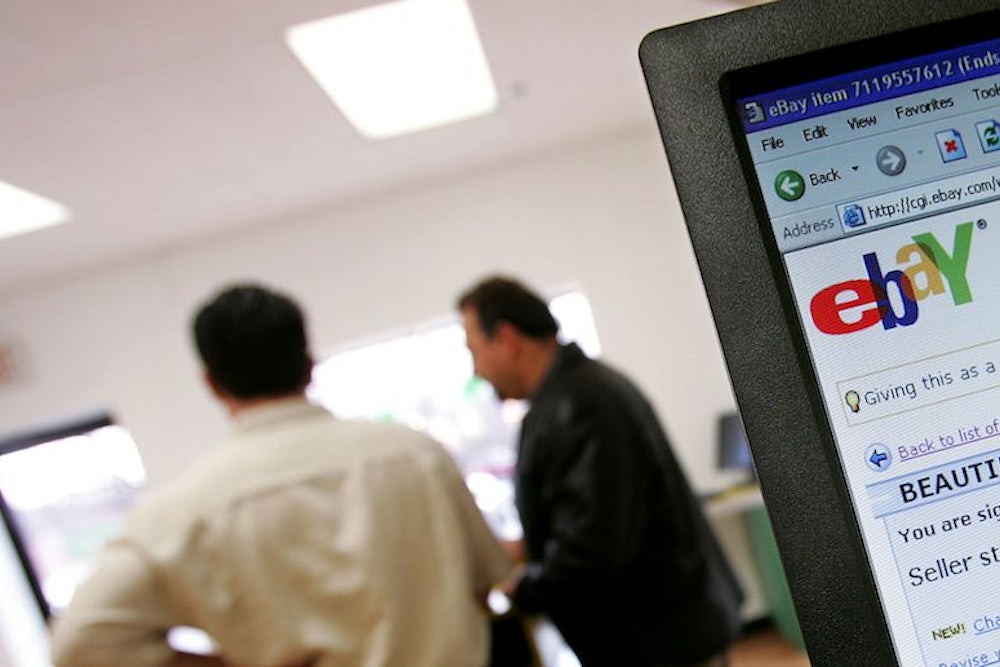If there's one thing Democrats and Republicans can agree on these days, it's that the Internet ought to be free. Both parties included an "internet freedom" plank in their 2012 platforms. Just last week, a House committee passed another resolution to head off international control of the internet, less than a year after doing essentially the same thing.
That's fine as long as we're talking about the global Internet, in the context of a United Nations body seeking to place restrictions on it, or authoritarian nations that wish to control the flow of information. The problems start when people use "Internet freedom" to justify other ideological ends.
Case in point: Opposition to the Marketplace Fairness Act, which would—at long last—require online retailers to collect sales taxes for each state in which their customers bought things over the Internet. It's backed by big companies that still derive good chunks of their sales from physical stores, as well as Amazon, which aims to eventually have enough of a presence in every state to deliver orders in less than a day (making them subject to sales taxes under current law). EBay has led the charge against the bill, fearing the impact on its smaller vendors, joined by right-wing groups that oppose all taxes, period.
Underlying the opposition: The idea that the Internet is a different kind of place, where our earthly regulations should not apply.
"The unregulated internet has provided an irreplaceable platform for small businesses development," pleads a form letter by the Americans for Tax Reform, posted on the Internet Freedom Coalition's website. "Please let the internet remain the free and open platform that has helped so many businesses grow." At Alex Jones' Infowars.com, an alarmist story titled "Destroying Internet Freedom by Taxation" frets about "snoops and spooks" and "an all-inclusive net of cyberspace registration."
This Orwellian worry isn't restricted to the political fringe: Democrat Ron Wyden, from sales tax–free Oregon, warns that allowing states to collect taxes from businesses outside their borders is just the first step down the slippery slope towards letting governments censor and control the Internet for more nefarious purposes. "The internet once again needs your help to push back against this unprecedented effort to apply local laws to a worldwide medium," he declares. "That hasn't happened in the past, and it's not going to work now."
It's true, the Internet has flourished as a zone largely free of government intervention. It's flourished so much, in fact, that purchases are migrating steadily online, and that trend will likely continue, with the rise of a generation of consumers for whom one-click buying is as natural as listening to music on their phones. It's not hard to imagine a future in which states' tax bases, without the revenue from online purchases, are whittled down to almost nothing. The Internet world is an ever growing part of the "real" world, and the two are becoming increasingly inseparable. If Internet commerce isn't held to the same basic standards, we could see our "real" world deteriorate at the expense of the virtual one.
Among the Internet's great virtues is its ability to make everything easy: setting up a business, communicating with customers, organizing records … and paying taxes. Opponents fret that it's unfair for online businesses to have to separate out different tax rates for 45 different states. But tools for managing sales and payments are already more than sophisticated enough to handle the task—every credit card has a billing address, after all—and the legislation requires states to provide appropriate software to the businesses it covers. Local governments that are legalizing online gambling are also legislating location-based online payments, having figured out how to pinpoint with near 100 percent accuracy where a customer is located. It might take a while for states to work out kinks in their systems, but to say it's impossible is to deny the reasons we value the Web in the first place.
Of course, there are better and worse ways to bring analog laws to the digital world—changing the underlying architecture of the Web to protect intellectual property, for example, would have done more harm than good. And certainly, there are times when the Web should just be left alone; just like in the real world, any kind of censorship or privacy-violating surveillance should be illegal. But saying we need to build a golden freedom fence around the Internet is like saying we shouldn't pass laws about the ocean or about the sky—two other frontiers of human enterprise that don't conform easily to local regulation, and yet need some rules of the road.
Much of the time, we even need laws in order to preserve freedom on the Internet. That's what House Democrats understood when they took issue with the latest resolution on Internet freedom to come out of committee, which originally declared the policy of the United States to "promote a global Internet free from government control." Doing so would've opened up any regulations on the net to legal challenges, in particular rules about net neutrality, which prevent Internet service providers from throttling different kinds of content.
So when someone comes along saying they just want to keep government out of your Internet, think twice: They might just be hoping to avoid paying their fair share.
